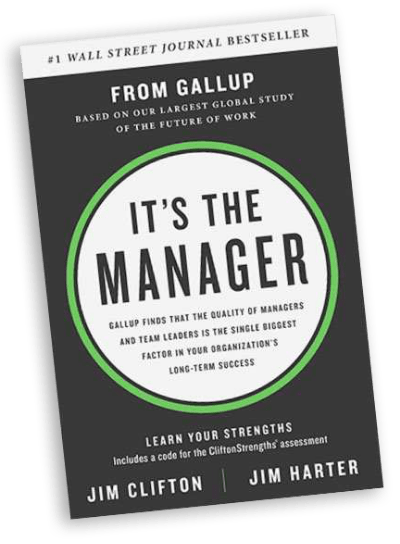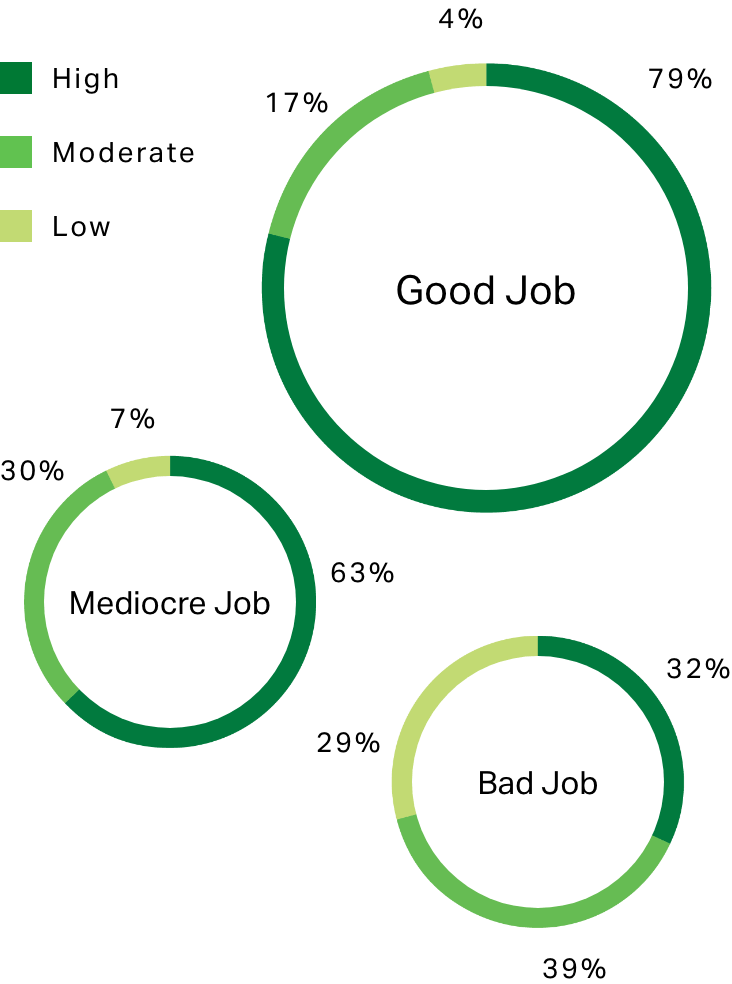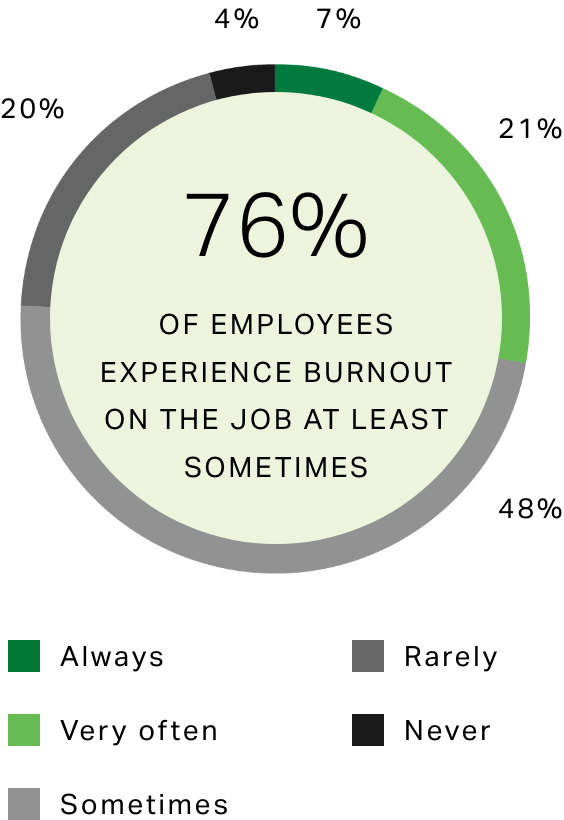How to Improve Your Career Development
- Introduction
- What Career Is Right for Me?
- What Should I Look for in a Job/Career?
- Finding Fulfillment in My Current Career
- How to Answer, "What Are Your Strengths and Weaknesses?" in a Job Interview
- The Benefits of a Career That Aligns With Your Strengths
- How to Avoid or Recover From Burnout
- Career Coaching Using the CliftonStrengths Domains
- Start Improving Your Career Today
A core question that nearly everyone can relate to is this: What should my job be or what career is right for me? We go online and turn to a free career aptitude test, frantically searching Google for an answer that will suffice and bring clarity to all our career questions, job search advice and concerns.
However, a "career finder" quiz doesn't paint the full picture. Results may offer some suggestions as to the careers or fields in which you might excel -- but all it does is narrow the scope of your options to fit them on a dartboard, leaving you blindfolded and hoping that the dart you throw lands on your "dream job" or "perfect career path."
In short, even with a list of possibilities, you're still left wondering what is right for you. Instead, the focus should be on answering "why?" and "how?"
What do you do when the career assessment quiz results show that you would be best in a role similar to that of an attorney or judge -- and you've just spent the last 15 years as a kindergarten teacher (a job you love and feel is your calling)? Do you quit your job, pack up your bags and head to law school? Probably not. Herein lies the flaw in focusing on what you're doing instead of the why or the how.
As you've probably figured out by now, we aren't going to tell you what your career should be. But that's because we're doing something better.
The rest of this page will offer you our best career advice, tools and resources you need to make your career goals and thrive in your day-to-day life -- ensuring that the career you choose is a good fit.

02 What Career Is Right for Me?
Think about the best day at work you've ever had.
What did that day look like? What made it great? Now think about what talents you were tapping into on that very best day. Maybe you:
- closed a huge sale, putting you in line to be the highest-selling sales rep of the year
- started working on a project with your best friend at work
- checked every task off your extensive to-do list before noon
- spent part of your day reading new materials from leading experts in your field
Consider this: There are ways to replicate and strengthen those same talents that went into making that day such a memorable one -- ways to help you feel more motivated, inspired, ambitious or capable of doing the job you're already doing.

On the other hand, maybe you've recently changed jobs or are actively searching for a new one. Either way, you can still feel more motivated, inspired, ambitious or capable in your job (whether new or in the future). Regardless of your career status or career goals, you have what it takes to excel -- you just need to learn, develop and use your strengths.
CliftonStrengths identifies what you are naturally best at. This research-based talent assessment can help you identify and pinpoint your natural patterns of thinking, feeling and behaving, which are then categorized into the 34 CliftonStrengths themes.
It explains the unique ways you accomplish your career goals by building relationships, thinking strategically, executing plans and influencing others -- and every career or job consists of these elements.
This is why it's necessary to know and deeply understand the things you're good at -- your strengths.
In fact, the more hours each day that Americans are able to use their strengths to do what they do best, the less likely they are to report experiencing worry, stress, anger, sadness or physical pain.
So stop taking aspirin for the headaches that naturally accompany career searches and making career decisions and lead with your strengths, instead.
Return to the prompt at the beginning of this section, about the best day at work you've ever had. There's a reason why that was your best day.

Closing a sale that made you the highest-selling sales rep? That's your Competition theme.

Working closely with your best friend at work? That's your Relator theme.

The satisfaction you derived from checking off your to-do list? That's your Achiever theme.

Having the time to digest and ponder new material from experts? That's your Learner theme.
The problem is, only four in 10 U.S. employees strongly agree that they get to do what they do best every day at work. This represents something greater than a search for the correct career -- it begs the question, "Do I get to use my strengths at work and do what I do best every single day?" This. This is the question we should be asking.
If you're feeling disengaged in your current career, this very concept could be the reason why. It is the most important factor for employees just like you as they consider whether to take a job with a different organization, and it is one of the main reasons they choose to leave a job.
So learn your strengths. Because when you do, you'll see that your CliftonStrengths do not dictate your career path. The most promising place to look for greater alignment between talents and career is in how you go about doing your role -- which CliftonStrengths is sure to help you navigate.
And remember, it's less about asking, "What career should I have?" and more about aligning the things you naturally do best with what you actually do every day -- allowing you to improve or excel in any career.
03 What Should I Look for in a Job/Career?
Have you ever heard someone say that they're searching for a new career path or that they're dissatisfied with where they're headed in their career path? There's a reason that careers are so often thought of as "paths" or journeys. People are looking for developmental opportunities, security and a purpose they can commit to long term.
We acknowledge that, for the duration of most of our lives, we will be at work. So, wouldn't you like to make the journey more pleasant? Work hasn't always been enjoyable, but here's some good news: the demands of the workforce are changing.

- My Paycheck
- My Satisfaction
- My Boss
- My Annual Review
- My Weaknesses
- My Job
In the past, employees have been working for a paycheck underneath a boss who may or may not care about them as a person, while focusing on their weaknesses in annual review meetings. We've found that this is no longer good enough.

- My Purpose
- My Development
- My Coach
- My Ongoing Conversations
- My Strengths
- My Life
Those days are gone, as employees (or prospective employees) search for much greater meaning in their work. Purpose, development, a manager who acts as a coach and ongoing conversations are a part of that bigger meaning. So, then, how do you know or decide what's important to you in a job?
Maybe you enjoy a standard 9-to-5 job and all the discipline that comes along with it. That's great and something that should absolutely be up to you. See, the idea behind a flexible work environment is autonomy with accountability, meaning the expectation is that with greater autonomy comes higher performance.

These benefits and expectations help make up the culture of a company. During a job search, career change or quest for career improvement, researching the company culture is a good place to start.
Know that the culture of a company determines the brand, which shapes how employees (or potential employees) and customers view that company. Therefore, don't be afraid to dig deep and ask big questions about the culture of a company, especially before applying.
Ultimately, the driving force behind your current or potential company's culture, benefit offerings and flextime availability is the manager.
Gallup knows that employees don't leave companies, they leave managers.
So, consider the questions: how do I like to be managed and what am I looking for in a good manager? Look for a manager who can make great decisions and places a heavy emphasis on trust and career development.

It's the Manager
Learn why the manager is key to every aspect of your workplace.
Here are some employee needs that must be met and how you know whether you're engaged in your career:
- You know what is expected of you at work.
- You have the materials and equipment to do your work right.
- You have the opportunity to do what you do best every day.
- You have received recognition or praise for doing good work in the last seven days.
- Your supervisor, or someone at work, seems to care about you as a person.
- Someone at work encourages your career development.
- Your opinions seem to count (at work).
- The mission or purpose of your company makes you feel your job is important.
- Your associates or fellow employees are committed to doing quality work.
- You have a best friend at work.
- In the last six months, someone at work has talked to you about your progress.
- In the last year, you have had opportunities at work to learn and grow.
In an engaging job, you should have the opportunity to do what you do best every day, and CliftonStrengths can help you determine what "best" looks like for you by revealing your natural patterns of thinking, feeling and behaving.
An engaging career expertly blends factors like how you like to spend your time, what you need as far as contributions go and how you define what matters most in your career.
So maybe your "dream job" is more than a specific job or career path -- maybe it's whatever career allows you to use your strengths and have the opportunity to do what you're best at.
When looking to answer questions like "What job should I have?", "How to find a job?", "What career is right for me?" or anything in the scope of a career, you may find it helpful to reach out to a career coach.
04 Finding Fulfillment in My Current Career
When attempting to improve or find fulfillment in a career, individuals often focus on the wrong things. Things like trying to mimic the success of others by doing things the exact same way, or pouring all of your energy into strengthening your weaknesses (without giving your strengths a second thought). While neither of these seems wrong at face value, they aren't what's going to improve your career or help you find the richest fulfillment.
There's a common myth among members of the workforce that "improving" or "moving up" in their career means taking on a management position. While this may be the case for some, it's certainly not the case for all.
Our research shows that the manager determines 70% of the variance in their team's employee engagement. Placing people in management roles or gunning for such a role yourself is a career move that should be given careful consideration. It's important to remember that there's more than one way to improve your career.
70%
variance in employee engagement caused by managers.
Think about it: You could live your whole career in the same office, at the same company, be one of the most successful people in your role and retire having never been a people manager. Improvement has more to do with your individual development and less to do with your job title or status.
Leading people should not be a reward; it should be a responsibility that requires talent and training. And that training must include expertise in the most important part of any organization -- its people.
05 How To Answer, "What Are Your Strengths and Weaknesses?" in a Job Interview
If you think there's a lot of information (or misinformation) in the world regarding finding the right career, you probably know that there's even more about what the "right" answers are to interview questions -- specifically, the "What are your strengths and weaknesses?" interview question.

Let's set the scene: The receptionist at the consulting firm you applied to just sent you into the meeting room for an interview. You've been preparing for this interview for weeks now (you even met every requirement listed in the job description) and feel confident in all the best-practice information you consumed from the internet, friends and family. You don't sit until you shake the hiring manager's hand, and when she asks you the first question … you freeze. You've forgotten everything you memorized.
We've all been there, or at least we've imagined being there, but there's a way to avoid this, "I'm frozen and now anxious" problem that often accompanies interviews. Answer honestly and frame your answers in terms of your strengths.
Answering the "What Are Your Greatest Strengths?" Interview Question
Knowing what you do best and why takes the panic out of your interview. A main reason individuals fear the interview process is because they really don't know what sets them apart, what they can uniquely offer, or how to talk about their strengths for fear of sounding arrogant or prideful. In short, people lack clarity in understanding their unique strengths and lack the confidence to talk about them when asked that specific interview question on strengths.
The temptation to answer in clichés is great, but the language and real-life applications of CliftonStrengths are the keys to answering authentically and leaving an interview knowing you truly offered your best self.

Instead of saying, "I'm a hard worker and have a real eye for details," you can talk about how you're highly disciplined and achievement-oriented, followed by legitimate examples of how that has looked in your previous work experience.

Instead of saying, "I'm a people-person and a real team player," you might say, "I enjoy the challenge of winning people over, and I can individualize my communication to meet the needs of those around me."
CliftonStrengths opens a new world where you can look forward to an interview because you have the confidence and clarity to excel. The gift of knowing yourself is wonderful, but it's made even better when you learn to communicate those strengths comprehensively.
Answering the "What Are Your Greatest Weaknesses?" Interview Question
Gallup defines a weakness as "anything that gets in the way of your success."
Understanding your weaknesses is important for far more than just the interview process. Knowing where and how you tend to consistently meet roadblocks that leave you feeling drained is vital for developing a deeper knowledge of yourself -- one that you can demonstrate to the interviewer and carry with you into any career.
The CliftonStrengths assessment gives you the confidence to accurately and authentically communicate your weaknesses. Because what an interviewer is really seeking when they ask this question is whether you're self-aware, honest and can manage those weaknesses.
Once employees are aware of and take responsibility for their weaknesses, they must find strengths-based strategies to manage them.

However, if you don't know your CliftonStrengths, understanding your weaknesses still begins with self-reflection. What are some tasks that are more difficult for you to begin and why? What is something that a coworker or manager might do or say that makes it challenging for you to do your work? Think about constructive feedback you've received in the past and if any weaknesses underlined that feedback. Don't be ashamed to admit real weaknesses and communicate them honestly. After all, if they hire you, they're eventually going to find out.
"Some people consider me a perfectionist. But really, I'm using my Maximizer (theme) to make it as perfect as it can. Because this can sometimes get in the way, I partner with others to help me keep moving forward with projects instead of working on something for too long."
Confidence matters: It's normal to be amazing at some things and less-than-great at other things. That's the nature of being human. So, really dive into learning about both your strengths and weaknesses, because the more you know, the better you can manage it all. Stop trying to be perfectly well-rounded. Start investing in your true strengths.
06 The Benefits of a Career That Aligns With Your Strengths
As you shape your career expectations, consider first what your strengths are. Take a moment to stray from what you believe your expectations should be and what others expect of you.
It's less about asking, "What career should I have?" and more about aligning the things you naturally do best with what you do every day -- allowing you to improve or excel in any career.
The benefits of having a career that aligns with your strengths are far-reaching and speak for themselves.
People who know and are able to use their strengths every day:

...have higher levels of energy and vitality
...are more likely to achieve their goals
...are more confident
...experience less stress
...are more effective at developing themselves and growing as individuals
Imagine how each of those benefits could positively affect your day-to-day work life and overall career outcomes. Higher energy, less stress, greater confidence -- these are the legitimate outcomes for which people who are currently trying to improve their career, start a brand-new career and switch careers are searching.
To appreciate the benefits of a career that aligns with your strengths, take a look at the current level of satisfaction that Americans have with their jobs based on the job characteristics workers care most about. Less than half of American workers are in good jobs and we've seen that the benefits of strengths-career alignment influence (positively or negatively) more than just a career. The benefits are personal.
To put this into perspective, job quality is similar to health status in terms of how well it predicts overall quality of life, and it's more predictive than income. Having a good job is akin to being in excellent self-reported health, whereas having a bad job is akin to having poor or fair health.
This alone is one of the single greatest benefits of finding a career that aligns with your strengths or incorporating strengths into your career. If you can improve your career and, in turn, improve your outlook on your job quality, you've just improved your outlook of your overall health. Therefore, the way you do your job matters, more than you may have ever thought.

Percent of workers scoring as high, moderate or low in their life evaluation by whether they are in a good, mediocre or bad job situation.
07 How to Avoid or Recover From Burnout
Nearly eight in 10 full-time employees experience burnout on the job at least sometimes.
Chances are, you've been burned out, are currently feeling burned out or are on the verge of burnout.
What Is Burnout and What Are the Causes?
The World Health Organization defines burnout as a syndrome conceptualized as resulting from chronic workplace stress that has not been successfully managed.
Although many factors in the workplace affect burnout in employees, these five correlate the most highly:
1. Unfair treatment at work:
When employees strongly agree that they are often treated unfairly at work, they are 2.3 times more likely to experience a high level of burnout. Unfair treatment can include all kinds of workplace issues, from bias, favoritism and mistreatment by a coworker to inconsistently applied compensation or corporate policies.
2. Unmanageable workload:
Employees who strongly agree that they always have too much to do are 2.2 times more likely to say they experience burnout very often or always at work. Even high-performing employees can quickly shift from optimistic to hopeless when they're struggling with an unmanageable workload. Having too much to do can take a variety of forms. Some people think about the long hours they work, while others are affected more by the many tasks they have to complete or the difficulty of the work.
3. Unclear communication from managers:
When managers don't provide employees with the information they need to do their job effectively, work becomes difficult and frustrating. Managers should explain role expectations, partnerships, processes and the impact of the employee's work. When expectations and accountability are inconsistent or unclear, employees can become frustrated and exhausted, just by trying to figure out what their manager wants from them.
4. Lack of manager support:
Manager support is central to preventing burnout. Manager support provides a psychological buffer, so employees know that their manager has their back -- even when challenges arise or something goes wrong. Supportive managers are there for their team members, listening to their needs and encouraging them.
5. Unreasonable time pressure:
When employees say they very often or always have enough time to do all of their work, they are 70% less likely to experience high burnout. Unreasonable deadlines and pressure can create a snowball effect: When employees miss one overly aggressive deadline, they fall behind on the next thing they are scheduled to do.
Notably, individuals handle time pressure differently. Employees who are a natural fit for a role tend to work more efficiently and sustain high performance for longer periods. They also have more positive daily work experiences and handle stress more effectively when under time pressure than employees who are not a natural fit for the job. In contrast, an effective way to create inefficiencies and increase stress is to ask someone to repeatedly do something they're not good at.
What Can I Do About Burnout?
If asking someone to repeatedly do something they're not good at creates inefficiencies and increases stress, repeatedly doing the things they're best at could have the opposite effect.
When you know your CliftonStrengths, this opens the door to having those conversations with a manager or coworkers about what it is that you do best. As CliftonStrengths reveal your natural patterns of thinking, feeling and behaving, you'll start to connect the dots between why you're feeling burned out and the ways you're not using your strengths.
And although managers are the ones who will have the greatest effect on employee burnout, here's what you, personally, can do in addition to learning and leading with your CliftonStrengths.

First, focus on the five elements of your wellbeing: career, physical, social, community and financial. When you focus all of your time on your career and it comes at the cost of your social life, time with your family, your workout routine, etc., you'll begin to notice how feelings of burnout creep up much faster than before. So, take time to invest in every area of your wellbeing.
Next, honestly communicate with your manager. Ask clarifying questions about what you're supposed to be doing, when it's supposed to be done and how you should manage priorities based on your current workload. These conversations not only relieve some of your stress, but they provide your manager with insight into how heavy your workload may be. Communicate, communicate, communicate.
Most importantly, remember that feelings of burnout aren't something you need to "get used to" or allow to become your new normal. Take the time to identify why you're feeling burned out, then invite someone else into that conversation.
08 Career Coaching Using the CliftonStrengths Domains
Whether you're a manager, career coach, life coach or simply helping someone else make career decisions, here are some best-practice approaches for tackling conversations about coaching people in their careers.
Start with these different questions that fall into four "buckets." Use them as a jumping-off point to guide a conversation regarding careers and how people like to work in order to accomplish goals:




Encourage individuals to decide which strengths drive them to strive, achieve and win. What does it take to get them excited about doing something?
Those four buckets mentioned above are the four domains of CliftonStrengths. Not only could knowing their strengths help an individual gain clarity and confidence, it can help them apply what they're good at in a more practical way. The 34 strengths are categorized into the four domains -- Strategic Thinking, Relationship Building, Executing and Influencing -- and are a great self-awareness tool.
The way individuals choose to build relationships, make things happen, influence others and think about things may not point to a specific career; however, if you can help someone understand more about what makes them great, you've given them so much more than answering the question, "what job is right for me?" You've helped them learn what makes them uniquely talented, which can be applied to any profession.
09 Start Improving Your Career Today
1) Have a conversation with your manager about professional development. Share your thoughts on areas where you'd like to learn more, receive more feedback, etc.
2) Think about the tasks you perform that give you the most energy. Now try to incorporate more of those tasks (or similar ones) in your day-to-day work.
3) Think about the tasks that drain your energy. Do you have any partners who enjoy those tasks who you could lean on to help make those tasks less draining? If so, reach out and ask for help.
4) Consider what strengths you have that could help you excel in those areas that you consider a weakness. De-energizing tasks may always be a part of your job, so use your strengths to perform them in a way that is both efficient and more energizing.
5) Look past your job title/career status (the what) and focus on how you enjoy getting things done and why you enjoy it so much. This helps put you on the path to an improved and more enjoyable career.
Questions/Prompts:
Who is someone, either at work or in your personal life, who could help you honestly think through what it is that you do best?
During a typical work week, what tasks do you perform with ease, excellence and enjoyment? Make a list of these tasks. You are likely capitalizing on your natural talents to get them done.
Of the items you listed, identify one that is the most important or produces the greatest success. Let's call it your strongest moment.
Focus more closely on your strongest moment. What makes it great for you?
What would happen if you borrowed some of the ingredients that make your strongest moment so great and applied them to new ways of approaching the tasks you enjoy less?
Don't Wait, Learn Your CliftonStrengths
Whether you're looking to improve, switch or start your career, be sure to make CliftonStrengths a part of that process!
Find out what makes you unique and lead with your strengths, today.
Learn More

